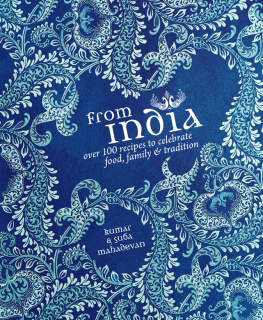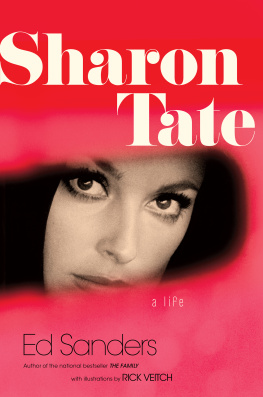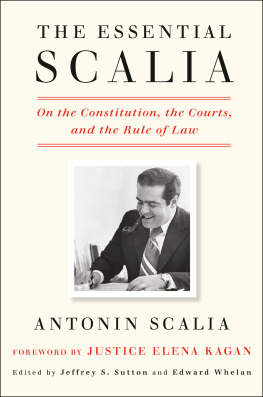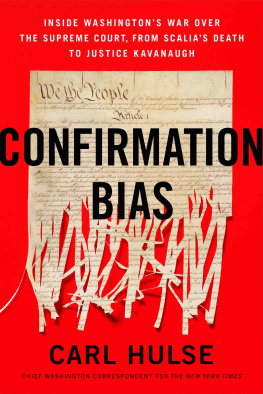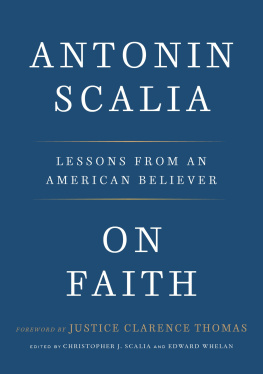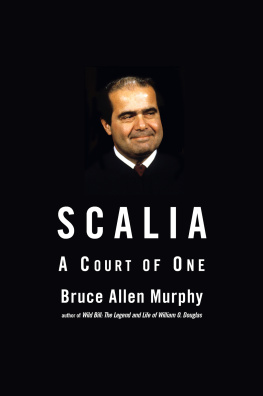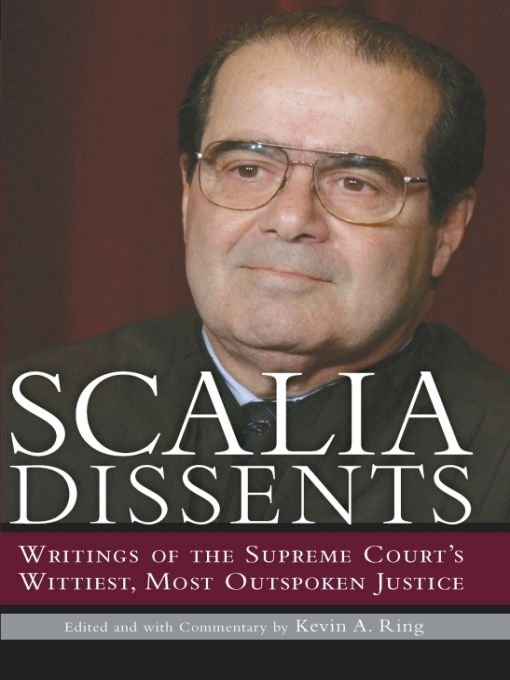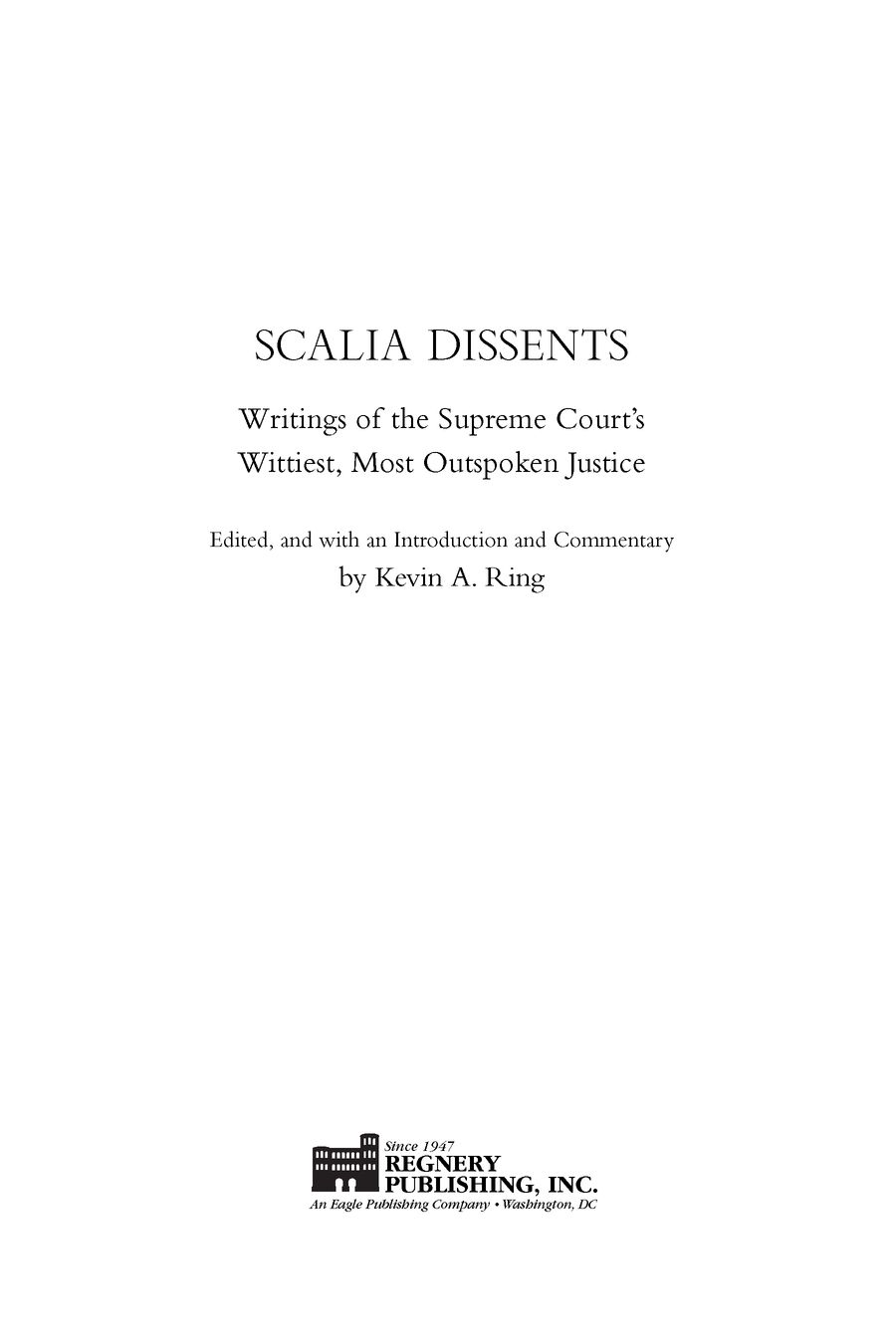Table of Contents
For Kerrie
INTRODUCTION
CALL IT A SCALIA MOMENT. You are reading the latest opinion of Supreme Court Associate Justice Antonin Scalia and come across a witty line or turn of phrase that makes you laugh aloud, an insight or observation that makes you nod your head in agreement, or a caustic barb that makes you wince for the target. Since his appointment in 1986, Scalia has been the Courts premier conservative, intellectual gladiator, and chief wordsmith. More than anyone who has served on the High Court in recent history, Scalia has given life to Aristotles injunction that it is not enough to know what to sayone must know how to say it.
His words can be pointed. Todays opinion has no foundation in American constitutional law, and barely pretends to, he charged in one case.
Scalias opinions can also be witty and humorous. Explaining why he did not think the Court should try to create a standard for defining literary or artistic value in an obscenity case, Scalia said... in my view it is quite impossible to come to an objective assessment of (at least) literary or artistic value, there being many accomplished people who found literature in Dada and art in the replication of a soup can.
His humor is often subtle. Consider his explanation of the proper meaning of the term, modify. Modify, in our view, connotes moderate change. It might be good English to say that the French Revolution modified the status of the French nobilitybut only because there is a figure of speech called understatement and a literary device known as sarcasm.
Scalia can use words to create vivid images that help communicate his arguments. In one case, rather than simply admonish the Court for its selective use of the oft-criticized Lemon test, which was created to identify government action that violates the religious Establishment Clause (see chapter seven), Scalia wrote, Like some ghoul in a late-night horror movie that repeatedly sits up in his grave and shuffles abroad, after being repeatedly killed and buried, Lemon stalks our Establishment Clause jurisprudence once again, frightening the little children and school attorneys of Center Moriches Union Free School District.
Decrying the Courts refusal to reconsider its controversial decision in Roe v. Wade despite agreement among the majority of the Court that the decision was flawed, Scalia said, It thus appears the mansion of constitutionalized abortion law, constructed overnight in Roe v. Wade, must be disassembled doorjamb by doorjamb, and never entirely brought down, no matter how wrong it might be.
In addition, Scalia has a talent for putting complex arguments about fundamental principles in easy-to-understand terms. Slicing through the various First Amendment analyses that might be applied to determine the speech rights of the religious, Scalia concluded, A priest has as much liberty to proselytize as a patriot.
Finally, as even casual followers of the Supreme Court know, Scalias words can reveal his outrage at the decisions reached and lack of judicial restraint demonstrated by his colleagues on the High Court. Scalia concluded one opinion, The Court must be living in another world. Day by day, case by case, it is busy designing a Constitution for a country I do not recognize.
Scalias way with words is what makes this book possible. His opinionsthough full of legal arguments and analyses only a lawyer could loveare highly readable. His entertaining writing style can make even the most mundane areas of the law interesting. It is no small feat.
The opinions chosen for this book are not necessarily Scalias most important, but those that I believe are the most interesting to read. Moreover, Scalia Dissents is not a technically accurate title for this book; a reader will recognize that more than just dissenting opinions have been included. However, it is fitting because nearly every opinion reveals Scalia in strong disagreement with the reasoning, if not the conclusion, of a majority of the Court. These disagreements often prompt the justice to write his most passionate and memorable opinions.
The following writings show Scalias judicial philosophy in practice, reveal his skill at argumentation, demonstrate his ability to foresee future controversies, and showcase his compelling writing style. In every opinion, a combination of these factors is at work. Before each opinion, I provide information to give the reader background on the case: the relevant text of the Constitution, its historical interpretation, Scalias general view of the text, the Courts previous decisions in the area, the relevant facts that led to the case, and the opinions of the Court and other Justices.
For the sake of readability, I have eliminated many citations and almost all footnotes. Legal opinions are usually full of references to other cases or materials in order to support the arguments made therein. If a reader wishes to dig deeper into one or more opinions, he or she should consult an unedited version of the opinions.
A note about labels: After describing Scalia as the Courts premier conservative, I spend some time arguing and include some cases to demonstrate that he is not always in step with political conservatives. The reason for the apparent conflict is that there is a difference between a judicial conservative and a political conservative. By political conservative, I refer to an elected official or political activist who supports a set of policies, including smaller government, lower taxes, and traditional social values. By judicial conservative, I mean a judge who does not advance any political or policy preferences, but whose approach to constitutional and statutory interpretation involves fidelity to the text of the Constitution and adherence to the original understanding of that document or to the intent of its drafters. A judicial conservatives approach will result in many politically conservative outcomes, but it should not and will not always be the case.
Finally, it should be noted that this book is not a personal biography of Justice Scalia. Though facts about his background are mentioned when relevant, I would like to merely share Scalias most compelling opinions and give readers, for the benefit of context, an overview of his judicial philosophy.
Justice Scalias way with words, his reasoning, and his visionall are showcased in the chapters that follow. Experience some of the most noteworthy, colorful, and entertaining opinions ever written by a United States Supreme Court Justice. And, finally, enjoy some classic Scalia moments.
CHAPTER ONE
SCALIAS PHILOSOPHY
JUSTICE ANTONIN SCALIA is a verbal craftsman. His mastery of language and respect for words carry over into his judicial philosophy. That philosophy is fairly simple and straightforward, and he has explained and championed it in his opinions, public speeches, and even a book. As with his memorable opinions, the primary focus of Scalias philosophy is words.
Scalia is a self-proclaimed textualist. He believes lawsand especially that supreme law known as the Constitution of the United Statessay what they mean and mean what they say. In short, when interpreting the Constitution, Scalia thinks judges should focus on the text. If someone claims he or she is being denied the exercise of a right or if the government asserts it has authority to take a given action, courts must make certain there is specific textual support for each assertion.






